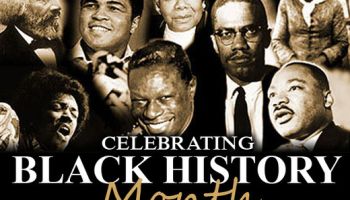
Source: Creative Services / iOne Digital
One of the most noteworthy periods of The Civil Rights Movement was 1955 to 1965. During that period, there was a struggle in the center of the country. It was a struggle to determine whether America would live up to its creed as a land of equal opportunity for everyone. That became “The Civil Rights Movement.”
We must not be confused. The Civil Rights Movement was not merely a loud argument over the lack of equality in this country. Many of the events recorded by history, and indelibly marked in the memory of those who lived through them became brutal and deadly. Those who were involved in the struggle on both sides were mortally serious about their respective causes. They were willing to fight and to even die to see their purpose fulfilled. The battle became a battle for the heart and soul of America and lasted for years. There was steady progress, but there were tremendous sacrifices made by the leaders of the movement who were committed to giving a new meaning to the phrase “set my people free.”
Brown versus the Board of Education. In all of African-American history, there may be no period more significant since the Civil War (1861-1865), the political and economic battle over slavery, when limited rights for African Americans were won. In the 100 years since the Civil War tensions in the country had been building. Then, the Supreme Court ordered desegregation in the schools in the historic Brown versus the Board of Education of Topeka (347 U.S. 483). That decision set the stage for what was to follow.
Montgomery Bus Boycott. On December 1, 1955, after a long work day as a seamstress, Rosa Parks defied the law. As an act of civil disobedience, she refused to give up her seat to a white man on a bus in Montgomery, Alabama. It was this incident that shaped the movement and became a great struggle for the rights of African Americans. This incident brought to the front line of the battle one of the most important figures to fight for Civil Rights of that period, the Reverend Martin Luther King who organized the successful Montgomery Bus Boycott.
The struggle for freedom in America has never been easy for African-Americans and was met with tremendous violence. The ten years that followed the Montgomery Bus Boycott saw some of the most critical milestones in black history.
* 1957 – President Dwight Eisenhower sent federal troops to Arkansas to secure admission to Little Rock Central High School by nine black students. One of the nine, Ernest Green, was the first African American graduate of the school in 1958.
* 1960 – The sit-in at Woolworth’s lunch counter in Greensboro North Carolina set the stage for a nonviolent protest. The sit-in was used with great success as the struggle continued. In March of the same year, 13 students at Texas Southern University stage a sit-in at Weingarten’s. Influenced by Martin Luther King, civil disobedience and nonviolent protest became a staple of the civil rights movement.
* 1963 – The historic March on Washington for Jobs and Freedom in which over 200,000 people gathered to hear Dr. Kings famous “I Have a Dream” speech, in which he called for an end to racism and civil and economic rights.
* 1964 – President Lyndon Johnson signed the bill that was the most significant event of his presidency. The Civil Rights Act of 1964 is a civil rights and labor law that outlawed discrimination based on one’s race, color, religion, sex, or national origin.
* 1965 – The assignation of Malcolm X and the Watts race rights.
* 1965 – President Johnson signs Executive Order 11246 on September 24, 1965, requiring no discrimination in hiring and employment by U.S. government contractors.
This list, while short, includes some of the most significant events during that decade of the African-American struggle for equal rights in America. This period began a redefinition of rights of all citizens, black and white, on the streets, the court bench and the different branches of government.
Breakthroughs in American Life. While the passage of the legislation was seen as a triumph, defacto discrimination continued as a result of economic inequality. Yet, significant progress continued. African Americans experienced breakthroughs in most areas of American life. From education to entertainment; from politics to sports there were many pride-filled moments. There were also moments of tremendous shame and heinous acts committed by white people and black people as well. However, through the struggle, American society continued to adapt, to expand and embrace the will of the people.
Protect the Franchise. We have been reminded during the past few years that the struggle is not over. Far from it. Discrimination and hate speech continues to be problematic today. For those who lived through it, it may seem easy to be regretful. But, the gains that have evolved from the struggle might also make one proud. We can be proud of the great leaders who demonstrated tremendous courage and wisdom to lead this nation to a better way of life. We can also be proud of America because it is here where such a struggle can result in equality and freedom for all citizens, regardless of race, religion, creed, sex, sexual orientation, gender identity, national origin, ancestry, age, disability or any other attribute that makes one “different.” However, the gains in civil rights must be protected. Our gains must be jealously guarded. Anyone who truly believes in freedom and justice for all should prove it by taking an active role in the process.
We Have a Participatory Democracy. The more that “we the people” are involved, the more democratic America will become. The more we the people are involved, the more impact we will have on in the decision-making process locally, state-wide and nationally. Whether we are involved in a community-based activity, advocacy work, face-to-face interaction with our political representatives, we the people must participate. Even if “we the people” cannot find the time to be involved in the aforementioned activities, the least we can do is to vote. Your vote is your voice. Speak up!
J Thomas Smith is the host of “Sunday Morning Live” on KMJQ/Majic 102.1 (9-11 am). He is an attorney, author, keynote speaker, and mental health consultant. Your comments are welcome: jtsmith@radio-one.com. Follow on Twitter @drjtsmith102; @ronejtsmith; IG @drjtsmith102
Black History Month: Spotlighting A Decade of Struggle was originally published on myhoustonmajic.com















